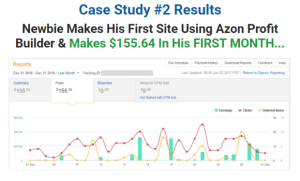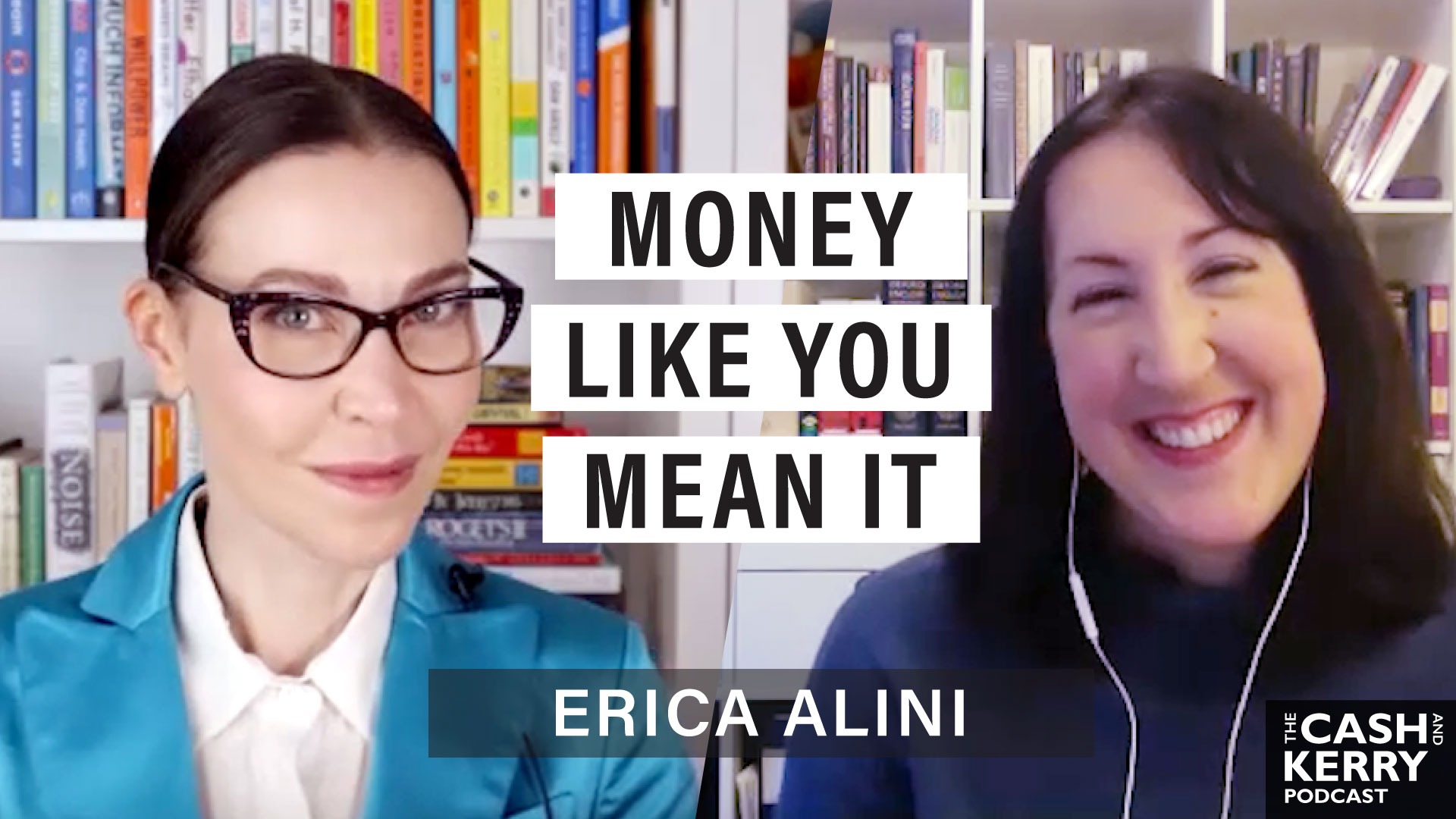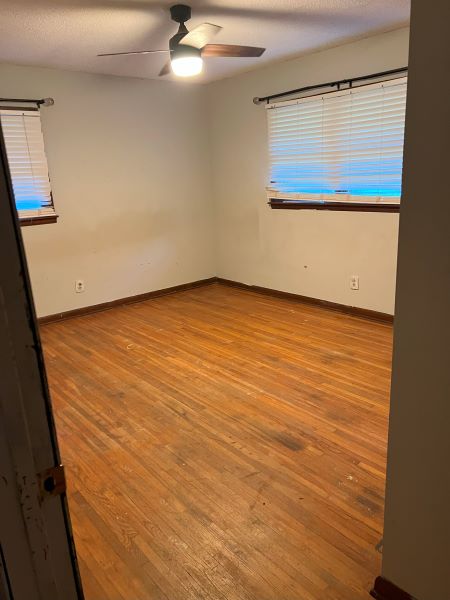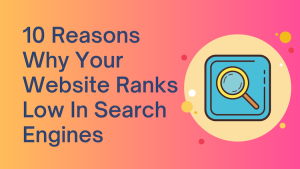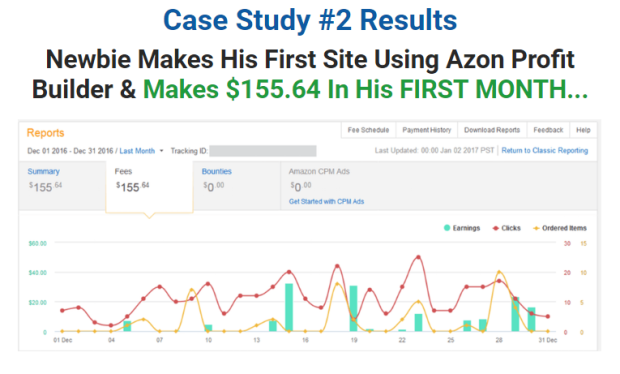Kerry K. Taylor: Welcome to the Cash and Kerry Podcast. I’m Kerry K Taylor. And this is where our expert guests reveal the money mistakes, and challenges that make us human. On the show today, I’m joined by Erica Alini. She’s an international journalist who has written for the Wall Street Journal, Global News, and now she covers personal finance for The Globe and Mail. Her business and economic stories have traveled the world. And today we’re talking about her new book Money Like You Mean It, Personal Finance Tactics For the Real World. Welcome to the show, Erica.
Erica Alini: Thanks for having me.
Kerry K. Taylor: No, it’s been my it’s my pleasure. I’ve been following your work at Global for eons. So I’m thrilled that you’ve written a book that brings it all together for us.
Erica Alini: Thank you. That’s. That’s so nice. I’ve been following your work as well. So it’s a, I’m a big fan,
Kerry K. Taylor: I’m more of a goof. I’m more of a goof than you are. But the last time we spoke, I was escaping wildfires in British Columbia and I was storing all my stuff in storage lockers. So right now we’re under like 10 feet of snow. It’s this climate thing is crazy.
Erica Alini: Yes. I, I remember I saw, so for a bit of background, Kerry tweeted that she was looking at prices of storage lockers and it was this crazy summer of fire in BC, and I thought, wow, that’s a personal finance story. It’s like the personal finance side of climate change.
Kerry K. Taylor: I know you have a. Sorry, go ahead.
Erica Alini: Yeah. And so we had this chat, about, you know, what do you do if you’re surrounded by fire, you know, trying to prepare and make sure, you know, try to limit the financial damage as much as possible. And it was, it was quite the interview and that’s why climate change is this part of my book. Cause it’s changing everything, including personal finance.
Kerry K. Taylor: Well, I know, I know climate change is a huge, huge interest of yours. So let’s go back there in a bit because I want to start with the title of your book.
Kerry K. Taylor: You called it Money Like You Mean It. And I don’t know. Sometimes I feel like my money is mean to me. So, so why did you hit upon this as your topic.
Erica Alini: So, initially, honestly, I was thinking of writing a book for, for every age. And then I figured because I wanted to write a comprehensive book that was kind of like a reference guide, a sort of, your go-to place someplace, you know, something to earmark and go back over and over as you face you know different big choices in your life financially. I had to narrow it down to an age range and of course my own age, my own demographic made the most sense. But this thing that, you know, the personal finance is becoming more complicated. I would say it’s true, most of all for millennials and Gen Z, older Gen Z, but that’s mostly because of the housing market, because, and the crazy housing prices really bring the challenges to a whole other level. But aside from housing, there’s so much that’s you know, the personal finance becoming more complex.
Kerry K. Taylor: Well, let’s look into housing. It’s it’s a hugely emotional topic. It’s probably the hottest topic in Canada and in cities across the world. And your beginning chapter is Everything Starts With Housing. So let’s look at housing affordability. What are we supposed to do? Where do we start?
Erica Alini: Yeah. So I called it, Everything Starts With Housing because I would say that is the challenge for Millennials and Gen Z. So I would say without question, the biggest financial issue that we face is finding affordable housing. So being able to balance the cost of housing with the cost of the rest of your life, that is really where it’s at for us.
Erica Alini: And so that’s why, like you’ve got to, that’s a huge decision. There aren’t that many financial decisions that can sort of set the course of the rest of your life financially. Housing is one of those, so you’ve got to get it right. And yes, it can be extremely emotional, and that’s what I, you know, what I try to do.
Erica Alini: There’s no magic wand. It’s going to be tough and it’s going to be, you know, you’re going to have to possibly face some difficult decisions, but it’s good to tackle it, you know, clear-headed and know what you’re doing and have a framework to make a good decision. And so what I, you know, what I say is, you know, if you were trying, I start from, you know, my premise is.t
Erica Alini: There is financially nothing wrong with renting. So, you know, I was born and grew up in Italy and I really had no concept that there was anything wrong with renting until I got to North America. And I was like, oh, I guess it’s very frowned upon for some reason. So I completely, you know, like, there’s, you don’t need to own a house to be a financially functioning adult by any means.
Erica Alini: So how do you decide. You have to decide, like whatever works best for you from a lifestyle point of view and from a financial point of view, that is the solution you have to go for. So here’s how to decide. So first of all, I would say preliminary thing you have to get out of the way is what is your time horizon?
Erica Alini: If you aren’t stable and you think there’s a good chance that you might be, might move, change cities, in the next five years, then don’t buy. It costs so much the transaction costs of buying a house and selling a house are so high that it really doesn’t make any sense. If you’re sort of looking for short-term housing, then it’s, you know, it’s default rent.
Erica Alini: If you’re sort of looking for a long-term solution. First thing that you might want to do is compare the cost of renting to what I call the “unrecoverable costs of owning” a home. So we all have this idea that we probably picked up from our parents’ dinner table, that renting is throwing money out the window, which, which it is, you know, you’re giving you’re giving the rent, goes to your landlord and you never see it again, but there’s so much money that you’re going to throw that out the window as a homeowner, too.
Erica Alini: This is one of the things I learned right away when I bought a house. It costs like houses are money pits. I don’t care how new it is. I don’t care. You know, if it’s in perfect shape, something will break every year. You’re going to have to spend money every year for upkeep and repairs. Not to mention that, you know, if you have a mortgage you’re essentially renting money from the bank.
Erica Alini: Yeah, that interest rate is certainly not building equity and that the interest that you’re paying your mortgage and you’re going to have property taxes, you’re going to have home insurance. There are all kinds of costs that you pay as a homeowner that do not build equity. So you want to compare your rent through those costs.
Erica Alini: And there’s a simple, you know, a back of the envelope rule in personal finance that you can use. So if you look at, you know, two comparable houses in your area, One is for rent and one is up for sale. If one year’s worth of rent is less than 5{e6a1e97ec1a15155ca0ed8c3e87721e561c99ed6e52274045963a20278fc2089} of the market value of that house, then renting is a good deal and vice versa, you know, then you’re in a sort of homeowner’s market instead of a renter’s market.
Erica Alini: So it’s really good to have an idea of what kind of market you’re in. So let’s say that renting is a, is a good deal. That’s it. Step two is, you know, it doesn’t matter if, you know, even if renting is a good deal, you have to be able to afford the rent. If you can’t save it as a renter, you’re going to be in big trouble.
Erica Alini: You can be a wealthy renter, if you can comfortably save and invest. So that’s another thing to keep in mind. If you cannot comfortably rent, then you’re facing, you know, the, this choice is, you know, you’re going to have to move out and see if you can you know, find something cheaper, maybe a little further, afield, in a different town, a different area.
Erica Alini: Or you’re going to have to think about increasing your income somehow. And it’s really, it’s really a bummer cause there are a lot of great jobs that don’t pay very much in big cities. I know all about that. So it is a difficult decision, but, you know, again, this is all about being clear sighted.
Erica Alini: And I would say, you know, even if, you know, say you’re, you’re happy with, with the fronting, you you’ve done the math, it’s the right thing to do financially. Then you run into the other problem, that there’s a lifestyle issue with renting here in Canada. Not always, and not everywhere. I know tons of long-term happy renters, especially in Alberta.
Erica Alini: But depending on where you are, I mean, I think Toronto for sure. And I’m, I’m thinking probably Vancouver is the same. It’s really tough. Like if you want to have a family and you’re going to need a bigger house, it’s a very difficult to find rentals, big enough for families. So much of the rental market was built with investors, real estate investors in mind and not tenants.
Erica Alini: And so we have all these tiny shoe box apartments that are affordable for your mom and pop real estate investors, but they have no storage space, you know, no sound insulation. Yeah. And they have the microwave and the marble countertops. And that’s gonna be great if you’re single, but the moment you start to, you know, want something more, it can be really difficult to find something that’s going to work for you and to find the stability, for example, like find the landlord that will want to sign you up for, for a lease that’s more than a year.
Erica Alini: So there’s, you know, set aside the math and see if you can find a rental solution that works for you.
Kerry K. Taylor: Yeah. I’ve I was lucky or unlucky enough to live in both Vancouver and Toronto, just as housing prices went bonkers. And I have to say like, just watching the ladder get pulled up in front of you. It’s so heartbreaking.
Kerry K. Taylor: Cause you, there’s no way to save enough money to keep up with that. So yeah, we rented when we were in those cities and I have to say, when I became a parent, it became really hard to live in one of those shoe box apartments. Because it’s really advantageous to have a room where you can close the door and put your kid in there at night, so you’re all not stuck in the same room. So real estate is just it’s so, so difficult. So I cannot agree with you more. But you also touched upon investing. So whether we’re renting or we’re homeowners, you say that learning about, sorry. Learning about investing is not optional. So what are my options?
Erica Alini: Yeah. So it’s funny because I started writing this book right before the pandemic and then so much changed as I was writing and investing is one of those. So I had this whole chapter planned out where I was going to argue that, you know, so many people are afraid of investing and investing has traditionally been treated as the, the personal finance 2.0 that like the advanced stage for, for experts, you know, like, you know, budgeting is the, the basics. And then, you know, if you really want to get into it, then you learn to invest and I was gonna, I do. So, argue against that mindset in my book saying, you know, like if you don’t have a generous employer pension, which, you know, unless you work in government, you probably don’t, but then you absolutely need to know how to invest because otherwise chances are, you’re not going to have enough money in retirement. But as I was writing, you know, then we had the, the crazy pandemic stock market, you know, the bull market and everyone, especially Millennials and older Gen Z started getting into the stock market. And instead of having all these people afraid of investing and started kind of seeing the opposite problem with people, getting super confident about their investing skills and, you know, bragging about having all their money in a single stock and stuff like that.
Erica Alini: And so basically what I want, I had to kind of rewrite the chapter midway through it to say, you know, even if you made a lot of money through the pandemic and you feel like you got a handle on this, you have to know the basics. Learning about investing is not optional, whether you’re afraid of investing or whether you feel super confident about investing, take a step back and make sure that you learn the basics.
Erica Alini: And by basics I mean, you know, you really don’t need to know anything very exotic. Just have a clear understanding of what is a risk when you’re putting money in the financial market and how do you manage it, which is really sort of what I go over in the chapter.
Kerry K. Taylor: It’s really about looking at risk versus fear versus greed versus, well, what are some of the investments that, you know, people can get into?
Kerry K. Taylor: I mean, when you look at risk and fear and greed, it’s like, okay, well, how do you make that balance, if you’re just starting out.
Erica Alini: Yeah. So I talk about, you know, how to, how to manage risks right there, you know, different, different things to think about. One of them obviously is, you know, diversification is one way to manage risks.
Erica Alini: So you’re putting your money in many different baskets. So making sure that you’re spread out across many companies and many industries, in many countries even, so that, you know, if something happens. If something goes down, then you’re going to have something that goes off and, you know, that’s, that’s one way of, of managing your risk.
Erica Alini: And then, you know, and you know, a very easy way. So my, my approach to investing is to, you know, keep it simple, low maintenance and low cost. And so three simple ways to do that sort of low, low cost, low effort investing. Three options, a solid option in Canada, and it’s all about index investing.
Erica Alini: Three ways of getting into index investing, which just means sort of following the ups and downs of a broad stock market index. You got index mutual funds. All in one ETFs or asset allocation ETFs, and robo-advisors, those are three very valid options. They have some small pros and cons and might work, you know, one might work better than the other for your particular situation, but they’re all three solid options. And that’s what I discussed in the chapter.
Kerry K. Taylor: No, it’s great. I really enjoyed that chapter. And another thing I was really excited to see is that you have a whole section on making money. I mean, it’s, you know, most personal finance books, don’t, don’t go into that direction.
Kerry K. Taylor: But over the pandemic, we’ve seen people aren’t shy to, to quit their jobs. It’s called the Great Resignation. And at first I laughed, but then I found it. This is really true. One of my most popular posts on my blog is How to Write a Resignation Letter, and that post gets crazy traffic. Every Thursday night and, and every Sunday morning.
Kerry K. Taylor: So I think those are the times where people sit back, reflect and rethink and reevaluate their, their life’s decisions and their career options. So I don’t know, are people rethinking their choices, that you’re seeing? And is this a good time to, to career jump, to find something better?
Erica Alini: That’s that’s hilarious.
Erica Alini: Thursday night and Saturday morning. It’s when you look at
Kerry K. Taylor: Sunday morning
Erica Alini: or Monday before Monday, and I want, I guess like Friday evening, I was too tired to think about that. And so it’s going to be Thursday evening. The things you find out looking at web traffic, or it’s just crazy.
Erica Alini: Yeah. So the Great Resignation, so speaking sort of, I used to be an economics reporter.
Erica Alini: So I guess speaking a little bit as an economics reporter, last time I checked, which was before the holidays, there, wasn’t a ton of evidence that we are seeing sort of a great resignation here in Canada, to the extent that it’s happening in the US. Anecdotally, I have to say, I am seeing it just in, in my circle.
Erica Alini: Lots of people changing jobs. But yeah, in aggregate, not so much. But, I have to say, I mean, there’s two things happening. We have a very tight labor market, all kinds of labor shortages. Since I’ve been in the labor force and I started smack in the middle of the financial crisis, this has been by far the best labor market that I’ve ever seen, where workers in so many industries have more bargaining power than they’ve had in decades. The other thing that could. It’s for people to, to change jobs is inflation, right? Like inflation is, is moving fast. It’s a, it’s really high. We haven’t seen it. We haven’t, I have no memory of inflation this high, personally, you know, and so living costs are, are really like, I can see it.
Erica Alini: Everyone’s seeing it like their, your grocery bill, it’s concerning and switching jobs in many industries is unfortunately the only way in which you’re going to get a significant raise. And so even if, you know, again, we don’t have a ton of aggregate evidence that Canadians are, you know, sending in resignation letters in mass, I wonder whether that’s gonna happen. I wonder whether a lot of people will be quitting and switching jobs just to take advantage of this great labor market and to keep ahead of inflation.
Kerry K. Taylor: Yeah. I’m seeing, I’m actually seeing a lot of movement in the high-tech market. I come from a computer science background and all my friends are just job leaping, just so they can, they can, I guess, reset their income level because if you’ve been with a job five or so years, you’re kind of locked into just an inflationary raise and those raises aren’t reflecting actual inflation, right? They’re like 2{e6a1e97ec1a15155ca0ed8c3e87721e561c99ed6e52274045963a20278fc2089}. So they’re not hitting like the four, the 5{e6a1e97ec1a15155ca0ed8c3e87721e561c99ed6e52274045963a20278fc2089} that we’re actually seeing. So I’m seeing like there there’s movement in that sector.
Kerry K. Taylor: So I’m going to ask you. Okay. So if people are moving around or they’re thinking of moving around, how do we make sure that we’re getting a salary or that we’re getting paid what we’re worth?
Erica Alini: Yeah. So that’s super important, negotiating your salary and, yeah, job hopping is, the whole idea is that when you’re switching employers, you have more, I mean, you have more bargaining power than you normally would as an existing employee.
Erica Alini: You know, you’ve just, you’ve, you’ve gone through what could have, you know, probably wasn’t a grueling interview process you’ve been selected. You’re number one. You’re the person that they want. And now you get to ask. Right? And so it’s really, really important to, and, every time I talk about negotiating your pay, everyone assumes that I’m super comfortable with it. I am absolutely not. I am awkward. I am shy. It’s not something I like to do, but I’ve learned how important it is. So just, you know, psych yourself up and you, you gotta do it. And to do it right. You have to prepare. So how do you prepare? So yeah, you have to figure out like, what is, and you may get a pay range, but you might not.
Erica Alini: So you have to, you have to figure out like, what is a good compensation for the role? What is the competitive compensation for your role that, you know, that you’re, you’re getting. The best way to do that is to do your own on the ground intelligence, you know, gather your own on the ground intelligence.
Erica Alini: See if, you know, you have colleagues or former colleagues who have had that role that you’re applying for, or maybe manage that role. So they would know what the compensation is. And just, just ask them. If it’s not their job, sort of ask them what’s, what’s the right compensation. If it is their job, you don’t want to ask them, so how much are you making? But a much better question to ask that’s not quite so forward is, you know, you play what, this HR expert that I interviewed for the book, Allison Venditti, she calls it the over-under game. So just, you know, pick a number that you think is you know, probably right.
Erica Alini: And say, hey, are you making more or less than X amount? And you’d be surprised she tells me Venditti was telling me, especially women are constantly surprised, they’re constantly undervaluing themselves. And so the over-under game, if you do it, you know, especially with a few people, you’re going to get a pretty good range and make sure if you’re a woman, make sure you ask men.
Erica Alini: With what they’re, you know, whether they’re making more or less than X amount that could help you make sure that you’re not sort of shooting yourself in the foot by asking for something that’s too low. Once you have a pretty good idea of the range it’s really important that you come up with an anchor value.
Erica Alini: So ideally you get to go first. You don’t always do, employers like to go first and they will low-ball you. So what you do then you do not want to go. If say you have a certain amount in mind, say, I don’t know, 75,000, you absolutely do not want to ask for 75,000. You want to ask for quite a bit more.
Erica Alini: So let’s say you’re going to ask for 85,000. That gives you a little bit of room to negotiate and make concessions and still hit that target that you have in mind. And once you’ve agreed on base salary, remember that even if you don’t, you know, especially if you don’t get like probably not in this market, but in a tighter market, you know, in a market where we have higher unemployment and some of a more difficult market, you might not get exactly what you want.
Erica Alini: But remember, there’s so much more you can ask for. And then adjust your base salary. There’s, you know, cash bonuses, stock options, there’s flexible work arrangements, super important. Especially if you have kids, you can ask to have a predictable schedule or, you know, at least know your schedule, maybe a week in advance.
Erica Alini: You can ask remote work is super important right now. You can even ask, and I didn’t know this, I learned this while I was writing the book that you can ask for the waiting period for health and retirement benefits to be waived. Sometimes employers are willing to do that, which I was like, you gotta be kidding.
Erica Alini: Cause I hate this waiting period. I wish I’d known that sooner. And sometimes, especially if you’re moving, say maybe from a government job where you have a really cushy pension to a private sector job that may be more competitive when it comes to pay, but less competitive when it comes to retirement benefits, you can ask, inquire about having a retirement payout.
Erica Alini: So basically a lump sum that’s meant to kind of make up for the fact that you’re moving from a more generous or less generous pension program or yeah, retirement.
Kerry K. Taylor: It’s almost completely opposite to what I learned. I always learned that the first, the person who mentions money first loses. So, you know, I guess the behavioral science behind it is showing that this anchor premise is what can really mess you up when it comes to getting what you’re worth right at right out, right out of the gate.
Erica Alini: Yeah, this is all based. It’s based on yeah. Behavioral research, and, yeah, I would like, negotiating, like negotiating anything. It’s not just pay, like, whoever goes first, like the first things that, you know, the first value or proposition that comes out in talks is generally like the anchor, like what we try to, our brain focuses on and if it’s low, it tends to anchor things down. Right. And that’s why you want to go high. Like if your employer is going low, like make sure you go high so you can meet somewhere in the middle. If you start out with what you want, you’re going to end up with less than you want.
Kerry K. Taylor: Yeah. I mean, I’ve made mistakes in negotiating my pay when I was working in high tech. And now that I’m a gig or freelance, you know, employee type, I have to renegotiate my, my paycheck every single time. And I have to say it’s really exhausting because it’s it’s nonstop. But one thing I learned really early on when I was in tech is that it really helps to have, I guess, an ally that works on the same team as you.
Kerry K. Taylor: This happened to me. So I learned that I was being terribly underpaid, like close to 20,000 and one of my team members who had the same education, the same background, the same skill level, he knew I was being underpaid. So when he left a job to job hop to another position, he left his, a note on my desk, what his salary was.
Kerry K. Taylor: And it was like, I couldn’t believe it, but that was like the biggest help to me, because then I realized I wasn’t just being paid 10 or 15{e6a1e97ec1a15155ca0ed8c3e87721e561c99ed6e52274045963a20278fc2089} under. It was significant. So I was pretty angry and I went into HR and I’m like, you’re underpaying me. And they wouldn’t budge. So I said, see ya, I’m off, you know, I, I know what this job is worth.
Kerry K. Taylor: And it was great because he actually hired me in the job that he moved to. So, you know, I had another ally there and I was paid equally. But to so many women, we don’t know. Right. Because job salaries aren’t posted, they’re not public. I mean, I can use Glassdoor to try and help see and get kind of a baseline, but it’s just such a dark magic sort of thing to, to tease through and figure out.
Kerry K. Taylor: But I love the over-under game because I think that’s a really less abrasive and easier way to get to people to figure out, you know, where exactly I can be when I ask.
Erica Alini: Yeah, for sure. And I would say it’s super important to have an ally and I’ve had similar experiences. And also it’s very important to be an ally, right?
Erica Alini: Like even as a woman we know that racialized women, people with disabilities are underpaid even more. So just be, be open, share, so that, you know, we can all get the pay that we deserve.
Kerry K. Taylor: So I love the chapter in your book about the retirement myth, because I feel this so hard. You know, when I was growing up, the story on the advertisements was Freedom 55, right? And it’s all of these really youngish people traveling. They look amazing. They’re dressed amazing. But that’s really a myth now.
Kerry K. Taylor: I don’t see this happening to anyone in, in any of our demographics. So what are your thoughts on why retirement is such a myth now?
Erica Alini: Yeah, my goodness. I mean, I was thinking even Freedom 65 was in like,
Kerry K. Taylor: That’s what the ads were when I was growing up. It was all Freedom. 55. Wow. That’s not going to happen for us.
Erica Alini: It’s not happening for a lot of Boomers either. No. So yeah, no, I would say retirement is, this idea of retirement is a bit of a myth. Not because you don’t want to, you know, saving for, you know, saving so that you are able at some point to stop working if you want to stop working or at least significantly reduce, your workload, you know, step off the hamster wheel, that’s super important, but this idea that, you know, we’re gonna go from working all the time to, you know, Aqua Fit classes and, or fishing or whatever it is, that’s kind of really disappearing. It’s not just a matter of that fewer and fewer people are actually able to retire at 65. They have to work longer, you know, just to be able to have the savings that they need.
Erica Alini: It’s also that a lot of people don’t want to retire completely, like there’s a lot of people who like their jobs and would like to simply take it a little easier, you know, have a little more time have and change the way they work from, you know, working to pay the bills, to working, to do something that you enjoy.
Erica Alini: That is really what retirement is becoming that this switch from, I no longer need to work. I want to work. And so the whole idea of retirement is becoming much more. Yeah, it’s really, more of a gradual shift, than sort of a black and white thing. And there’s really nothing wrong if you feel like your, your, your job and you like working.
Erica Alini: Just keep working beyond 65, is really, is not, it’s not a failure to, to not be able to retire by 65. And, and honestly, if you look at the statistics and you look at history, retirement’s been a bit of a myth forever. Not, not just for, for our generations. The idea that, you know, you had a job and you had this great pension and then you’d get to the gold watch and retire at 65.
Erica Alini: That was really mostly true for men. Even if you go back in the fifties and sixties, like a lot of women were in the workforce and they have all these precarious part-time jobs that didn’t have pensions. So it’s always been a bit of a myth. Yeah,
Kerry K. Taylor: so, okay. So for if we’re starting out or if we’re in the middle of it, or if we just want to get started today, because today is always a fresh start.
Kerry K. Taylor: How would you say we, we start to save, I know you’ve, you’ve incorporated some behavioral science in there as well to help get past the human nature of do-nothing-ness, so where do we start using the science that can help us?
Erica Alini: Yeah. And so I want to be very clear. So I would kind of let go the idea that you’re going to retire at 65, especially because so many of us like are staying in school longer, we have, we’re much more likely to have employment gaps.
Erica Alini: You know, if it’s going to take a little longer than, you know, 65 maybe to, to get to the point where you can pull back, but it’s super important to, to save up, to be able to, you know, to have that financial freedom to stop working because you have to pay the bills. That really is the, the goal, that financial freedom.
Erica Alini: And so you gotta start, like the sooner you start the better and that’s the, you know, probably lots of people are familiar with this, the importance of compound interest, you know, the money that interest earning interest on interest. Okay. The longer, your, your timeframe for saving for retirement?
Erica Alini: You know, time is really what supercharges compound interest. So the sooner you start the better, how much to save for retirement is really a bit of a difficult question. If you’re just starting out and you have no idea what your income is going to be, you have no idea what you want in retirement.
Erica Alini: So it’s really super important to just focus on establishing the habit of saving for retirement. Look at your budget, see, you know, what looks doable. And even if it’s like 50 bucks a month initially, just, just put it away. And then every year sort of reassess how much you’re saving based on your, your salary, your income.
Erica Alini: If you got a raise, then, you know, give yourself a raise in terms of your retirement savings as well. And you know, if inflation went up, try to keep up with inflation and that’s how you start, you know, early on, and then as you get a little bit closer to retirement and you know, you have an idea of maybe what your income trajectory is going to be, and you know, what you want to do in retirement, what kind of lifestyle you want to have and what your needs are going to be financially.
Erica Alini: Then, then you can get into some of the more complicated math of trying to figure out what you need and, what you need to save up to get there.
Kerry K. Taylor: I always look at if people get a bonus or they get an inflationary raise, I was always thinking, well, maybe just put the bonus in your RRSP or your tax-free savings account or take that inflationary raise if it’s not cutting too much into your cost of living and let it go in because then you’re not feeling the pinch as hard.
Kerry K. Taylor: So that’s always something I get my husband to do. He’s a little grumpy about it, but cause he’s got like a full-time job at, you know, it’s just, it’s something that works as well. If, if you’re in that kind of a, a job
Kerry K. Taylor: situation.
Erica Alini: Yes, that works very well. If you have a steady job.
Kerry K. Taylor: Yeah, I don’t. So I can’t do that.
Kerry K. Taylor: There’s nothing steady about my work. So I’m, like, I’m like a lot of gig or freelance people out there we’re growing numbers. So, so guys, if you’re out there, I, I get it.
Erica Alini: Since we just brought up sort of, freelancing and gig work, that is something that I, that I talk about in the book. So maybe, yeah. I mean, I love to, to chat about that. Cause as you said, I wanted to tackle the income part of the equation because it’s such a challenge.
Erica Alini: For, for young people and it’s super important. So, I mean, yeah, I like personal finance, it’s not just about penny pinching and investing. It’s all about, you know, it’s also about making sure that you make enough money and, you know, how do you do that? You know, it’s no longer like, just get a job and start saving.
Erica Alini: You got a steady job or you’re better off freelancing and being your own boss, should you have a side hustle? And, you know, I wanted to have a whole discussion about side hustles because they’re so mythologized, it’s not only online and I’m really against working all the time. And so when I see that sort of provide a framework for people to, to try to evaluate, whether having a side hustle is worth the hassle or, or not
Kerry K. Taylor: The side hassle – hustle with the side hassle.
Erica Alini: And, yeah, I, because I’ve been a freelancer and I’ve had a lot of steady jobs and, I have to say I would so love to be able to be a freelancer, but I constitutionally can’t, I’m just one of those people who need the structure. I am not a good boss of myself.
Kerry K. Taylor: Neither am I. I’m the worst boss ever.
Kerry K. Taylor: She doesn’t give me a break. She won’t let me go out for holiday. She makes me sit in my basement, you know? Worst boss ever, but there’s advantages too!
Erica Alini: Oh yeah.
Erica Alini: There’s these. Yeah. There’s a lot of advantages
Kerry K. Taylor: So who should, who should do a side hassle and who shouldn’t?
Erica Alini: Yeah, so a side hustle. I mean, you can have a side hustle, actually even if you have a, a full-time job, right.
Erica Alini: But yeah, there’s this whole idea, you know, especially because Millennials, like we need so much income, just to make ends meet and buy a house, right. There’s this whole idea like, oh, it’s just going to work super hard and you know, we’re going to be tough, but we burn out really quickly. And also, being burned out is not, not good.
Erica Alini: Like you may miss, if you’re working all the time and you don’t have time to stop and think about what you’re doing and where you want to go with your life. You may not even, you may miss opportunities, you kind of get tunnel vision when you’re working all the time. So when should you get a side hustle?
Erica Alini: So my basic. My perspective is if you’re working to more than one job all the time, then that’s not, that’s not good. That’s just, that just means you need to get a better job, period. Like focus on the one job and get something that pays better. But site hustles can be good. And I would say they’re good, in three, three instances. One is if you have something that you really like doing, and you can monetize it and you know, it’s, it’s a hobby. It relaxes you, it gives you something else to do. You, you use a different part of your brain and you can make money on it. Absolutely. You know, that’s, that’s great.
Erica Alini: Just make sure that it doesn’t become a second job. Like even if you’re baking or you find yourself, you know, at 10:00 PM at night, You know, frenzy of flour and eggs,
Kerry K. Taylor: That sounds like fun. I’d like to be in a frenzy of flour and eggs.
Erica Alini: If it becomes stressful, you know, like watch out. Another thing like side hustles can be like a good short-term, sort of way to boost your income. So say like, you really want that vacation. And then maybe, you know, temporarily you pick up a side gig just to get you there, or maybe you’re saving for a down payment for a house.
Erica Alini: And then, you know, maybe for a few years you have a side hustle just to help you save faster, you have a specific goal and specific end date. That’s, that’s fine. And side hustles can be a great way to transition to a different career, without sort of, incurring. It’s a low risk and low cost way of transitioning to a different career.
Erica Alini: It’s kind of like you started doing it. You know, you start exploring a different field, with a side hustle and then if you like it, you know, gradually you build contacts, maybe you build clients and then, you know, when you’re finally ready to, to make the big jump. You kind of like, you already know the job very well.
Erica Alini: You don’t need, you don’t have a huge learning curve. You don’t have to, you know, your income never dips. It’s, it can be a really, I know a lot of people who have used site hustles to gradually transition to a completely different field that they liked better. And yeah, and basically in, you know, they, they, they boosted their income and they never needed to take a break and go to school.
Erica Alini: So. Yeah, those are three, three things. I think that site hustles worked really well for.
Kerry K. Taylor: I definitely fit in group three. I mean, I was a software developer and I started the blog and it was mostly just to educate my colleagues, how, how to better invest their money for retirement, because I saw all these guys buying cars and I was riding my bicycle to work.
Kerry K. Taylor: And brown bagging my lunch and they were just spending all this money. So it should have tipped me off that they were making a lot more than me, but I started the blog – I know. Right. But I started the blog to try and get them to invest more of that money for the future. And it took off, I couldn’t believe it, but I was doing it anonymously.
Kerry K. Taylor: So. I didn’t want my employer to know I was explaining how to maximize our retirement plan, but it took off and it was, it was a lot of fun and I was just writing articles for my colleagues. And next thing I knew we put it on a blog and then it went crazy. So that can happen whether you’ve got like a social channel, or if you do run a website, it’s bizarre how things can just take off.
Kerry K. Taylor: And I really found it hard at first because here’s my voice out there. And it’s really intimidating to put an opinion or as you know, to, to put yourself out there. But when you do some, some really magical things can happen. So if you’re that person listening right now and you’re thinking, oh, I have this idea.
Kerry K. Taylor: Go with, go with Erica’s number three option and get your toes in the water, get your feet in the water and see how that works for you. Because taking a chance when you’ve still got income in the background, as you say, it’s not a huge risk and it could be high return.
Erica Alini: Definitely. Yeah. And it’s also, sometimes you have a fantasy that you really like, you know, a certain, like I want it to be a foreign correspondent.
Erica Alini: I never thought I’d be writing about money. And then I actually tried it out and I was like, I so do not like this. I am not cut out for it,
Kerry K. Taylor: But you’re great at it. You’re like one of Canada’s top financial writers
Erica Alini: Journalism. Absolutely. I always wanted to be a journalist. I just didn’t know what kind of journalist I wanted to be.
Erica Alini: And I was shocked, shocked from my entire, you know, life growing up, I wanted to be a foreign correspondent. And when I actually tried it out for real, it was like, uh-uh.
Kerry K. Taylor: Okay, so Erica, where can we find you?
Erica Alini: Yeah, so you can find me at The Globe and Mail and on Twitter, I’m @ealini, so if you, you know, if you have things that you want to bring to my attention, things that you think I should cover in terms of personal finance, or you want to tip me off about something, feel free to get in touch.
Erica Alini: Both through my email at The Globe, or Twitter. My DMs are open and if you’re interested in, buy my book, It’s available everywhere you buy books. Obviously, you know, Amazon and Chapters Indigo, but it really is in a ton of small, independent libraries and bookstores. So yeah, check it out. POPUP OF BOOK NAME HERE
Erica Alini: It might be on the shelf at the store right around the corner.
Kerry K. Taylor: Amazing.
Kerry K. Taylor: So Money Like You Mean It, Personal Finance Tactics For the Real World, it really is a definitive source for everything money. The author is Erica Alini and the book is on sale now everywhere. And if you want to check out Erica’s amazing work covering personal finance,
Kerry K. Taylor: head on over to The Globe and Mail and check out her Twitter account @ealini – that’s at E A L I N I and I have to say she’s a lot of fun. She’s a great follow. And if you have a story to share with her, she’s on it. Anything from climate change to the retirement myth, she’s there. So, Erica, thank you so much for coming on the show.
Kerry K. Taylor: I really appreciate having you.
Erica Alini: Thank you so much for having me.
Kerry K. Taylor: Okay. Now I want to hear from you guys, have you found success with the housing market? What is your job negotiation tactics get to get what you’re worth, or were there other insights you got from the interview? I want to hear about it from you in the comments.
Kerry K. Taylor: Now the best conversations happen over at Squawkfox.com so head over there and leave a comment right now. And if you’re not already, please subscribe to my email. To become a squat box insider. You’ll get my free budget bundle and my free audio course called how to, how to afford the life you want. Thank you so much for tuning into the cash and carry podcast and I’ll catch you next time.






